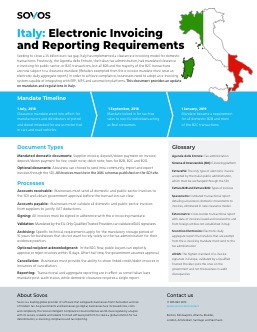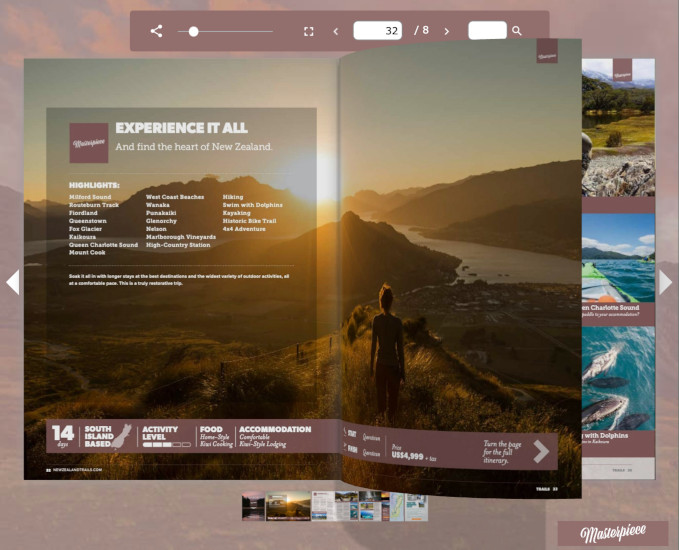About Sovos Sovos is a leading global provider of software that safeguards businesses from the burden and risk of modern tax. As governments and businesses go digital, businesses face increased risks, costs and complexity. The Sovos Intelligent Compliance Cloud combines world-class regulatory analysis with its secure, scalable and reliable S1 cloud software platform to create a global solution for tax determination, e-invoicing compliance and tax reporting. Contact us +1 866 890 3970 www.sovos.com/contact Boston, Minneapolis, Atlanta, Boulder, London, Amsterdam, Santiago and São Paulo Italy: Electronic Invoicing and Reporting Requirements Seeking to close a 35 billion euro tax gap, Italy has implemented a clearance e-invoicing model for domestic transactions. Previously, the Agenzia delle Entrate, the Italian tax administration, had mandated clearance e-invoicing for public-sector, or B2G transactions, but all B2B and the majority of the B2C transactions are now subject to a clearance mandate. (Retailers exempted from the e-invoice mandate must issue an electronic daily aggregate report.) In order to achieve compliance, businesses need to adopt an e-invoicing system capable of integrating with ERP, MPS and automation platforms. This document provides an update on mandates and regulations in Italy. Glossary Agenzia delle Entrate: Tax administration Sistema di Interscambio (SDI): E-invoicing platform FatturaPA: The only type of electronic invoice accepted by the Italian public administration, which must be exchanged through the SDI Fattura B2B and Fattura B2G: Types of invoices Spesometro: Outdated transactional report detailing a business’s domestic movements to invoices, eliminated in new clearance model Esterometro: Cross-border transactional report with data of invoices issued and received to and from foreign entities not established in Italy Scontrino Elettronico: Electronic daily aggregate report that retailers that are exempt from the e-invoicing mandate must send to the tax administration eIDAS: The highest standard of e-invoice signature in Europe, validated by a Qualified Trusted Provider; puts the onus on the government and not the business in audit discrepancies Document Types Mandated domestic documents: Supplier invoice; deposit/down payment on invoice; deposit/down payment for fee; credit note; debit note; fees for B2B, B2C and B2G. Optional documents: A business can choose to send intra-community, import and export invoices through the SDI. All invoices must be in the XML schemas published on the SDI site. Processes Accounts receivable: Businesses must send all domestic and public-sector invoices to the SDI and obtain government approval before the transaction can clear. Accounts payable: Businesses must validate all domestic and public-sector invoices from suppliers to justify VAT deductions. Signing: All invoices must be signed in adherence with the e-invoicing mandate. Validation: Mandated by the EU. Only Qualified Trusted Providers can validate eIDAS signatures. Archiving: Specific technical requirements apply for the mandatory storage period of 10 years for businesses that do not want to rely solely on the tax administration for their evidence position. Optional recipient acknowledgment: In the B2G flow, public buyers can explicitly approve or reject invoices within 15 days. After that time, the government assumes approval. Cancellation: Businesses must provide the ability to show linked credit/debit invoices in instances of cancellation. Reporting: Transactional and aggregate reporting are in effect as some Italian laws mandate post-audit status, while domestic clearance requires a single report. Mandate Timeline 1 September, 2018 Mandate kicked in for tax-free sales to non-EU individuals acting as final consumers. 1 January, 2019 Mandate became a requirement for all domestic B2B and most of the B2C transactions. 1 July, 2018 Clearance mandate went into effect for manufacturers and distributors of petrol and diesel intended for use as motor fuel in cars and road vehicles. Next >
NOTE: This publication is pending deletion . The account which was used to upload this publication needs to be renewed in order for this publication to stay online.

